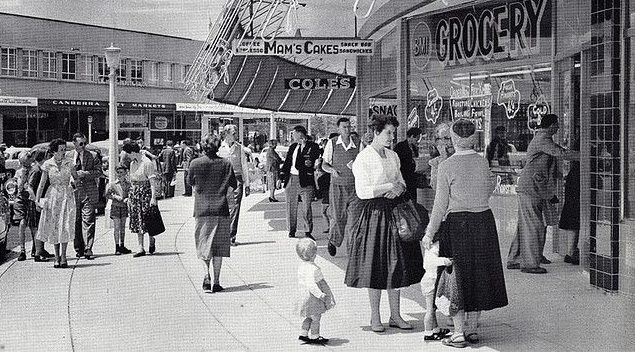
“Instead of celebrating differences and the advantages of a planned city, Canberra is inexorably falling into line with unplanned cities across the world. This may suit the giants of property development, but the changes undermine the benefit of being an average Canberran,” says columnist MICHAEL MOORE.
ONE hand of the ACT government is making an effort to beautify Canberra’s Civic centre; the other, unfortunately, is busily undermining small businesses, and the associated vibrancy, that is key to keeping the area attractive.

Boarded-up shops are not just about an outcome of the pandemic. The issues go deeper.
Whether intentionally or not, Civic is surrendering open walking places and lively shopfronts in favour of more residential tower blocks and malls. The unique character of the centre of Canberra is becoming like every other city in the world.
Instead of celebrating differences and the advantages of a planned city, Canberra is inexorably falling into line with unplanned cities across the world. This may suit the giants of property development, but the changes in character undermine the benefit of being an average Canberran.
The ACT government has been systematically reviewing leases in Civic to ensure that they are financially compliant with the purpose clause. The purpose clause defines whether a piece of land can be used, for example, for business purposes, entertainment or perhaps residential use. The more options available often increases the value of the land.
The higher the value of land, the greater the revenue from land tax and rates. A business-oriented purpose clause has been most valuable in the past. With developers seeking to build more and more apartments, the value of residential land has increased exponentially.
One case has seen a tenfold increase in the value of the land when the government reviewed the purpose clause. A long-term operator of a small business is on what turns out to be a lease that may also be developed for residential. Suddenly the business is no longer viable thanks to vastly increased rates.
Although ACT revenue is facilitating a transition to allow time to meet the much greater payments, it simply enables the business time to wind down and work out how to close. This is particularly frustrating when the business is not the owner of the land but will be forced to pay much higher rents to cover the increased costs. An additional frustration is that the benefit of the increased value of the land goes to the landlord rather than the tenant.
In principle, the leasehold system was designed to ensure that the community benefits from increased value of the land. However, perhaps the government should be taking a more nuanced view and finding a way to protect small businesses. Appropriate planning controls on the centre of the city should be implemented to allow small businesses to thrive in an appropriate environment, not just in big, central malls built at the whim of giant developers.
As small businesses close, others are driven into a mall environment that invariably means more and more large chains rather than locally owned stores. These chains are common to malls all over the world. They have their place. They just ought not dominate retail and other small businesses.
The large apartment buildings with minimal setback, add to the impression that the planning of our city is not in the best interests of ordinary Canberrans and, rather, is being dictated to by developers. No doubt it is frustrating for city planners to be constantly criticised. However, their role is to provide advice to the government and if that advice is overridden by big companies, they will continue to be criticised. The role of the ACT government is to consider the advice in the light of the Budget, the financial well-being of the community and the long term character of the city. The buck does stop with the government!
The role of the members of the Legislative Assembly is to review what the government is doing and to ensure that the balance favours the “community good”. It is not in the interest of the community to have local small businesses pushed further and further from the financial and administrative hub.
Unless Canberra can find an appropriate balance between protection of small businesses and raising revenue, the character of the city will invariably change. And it will not be for the better.
Who can be trusted?
In a world of spin and confusion, there’s never been a more important time to support independent journalism in Canberra.
If you trust our work online and want to enforce the power of independent voices, I invite you to make a small contribution.
Every dollar of support is invested back into our journalism to help keep citynews.com.au strong and free.
Thank you,
Ian Meikle, editor





Leave a Reply